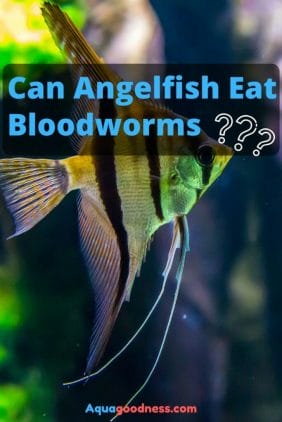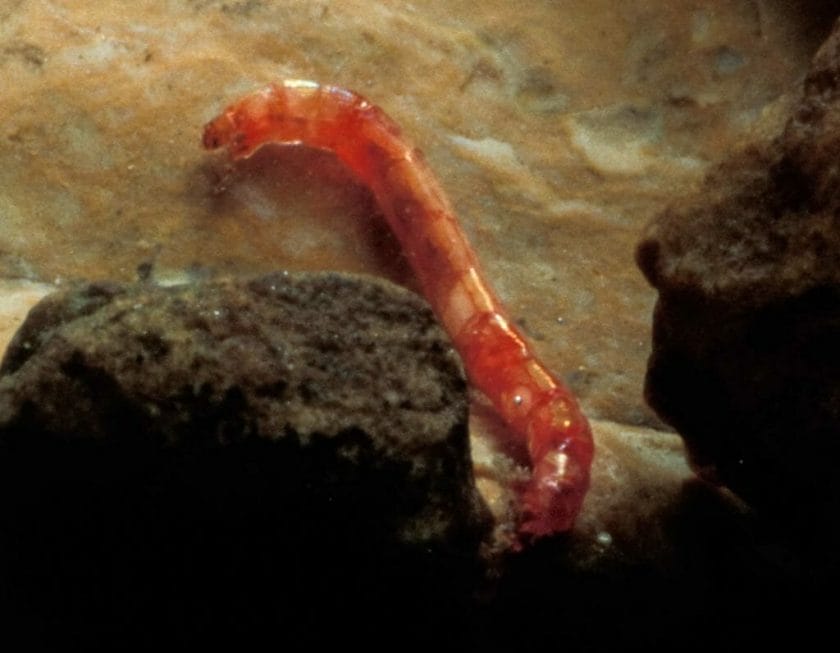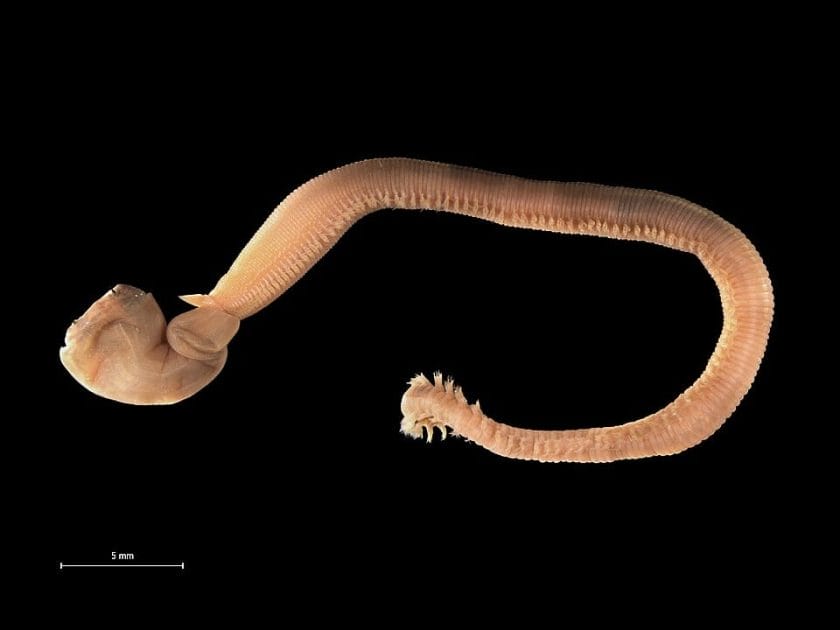Bloodworms are commonly fed to any aquarium fish.
But can angelfish eat bloodworms? Will it cause any problem?
Or you may have fed bloodworms to your angelfish and it is bloating after eating it.
And now you are wondering if angelfish can actually eat bloodworms or not.
No worries…
In this article, I am going to answer all of your questions.
Angelfish can eat bloodworms. But you should not overfeed them.
Feeding them bloodworms once per week is a good rule of thumb to follow.

Table of Contents
Are Bloodworms Good for Angelfish
Blood worms are protein-rich and they are good for your freshwater or saltwater angelfish.
But it should not be the only diet of your angelfish you should also feed eat other types of food like flakes and pellet food.
Though bloodworms are rich in iron and protein it doesn’t contain some essential amino acids, vitamins, and minerals that are essential for the proper growth and breeding.
Besides, bloodworms are also very hard to digest. Especially, the head of the bloodworms is very hard to digest.
So you should not feed it frequently.
Feeding blood worms once in a week is a good rule of thumb to follow.
If you notice your angelfish is bloating after eating bloodworms then you should try a different brand of bloodworms.
There are some brands that don’t sterilize bloodworms that can cause this issue.
So changing the brand can help.
Types of Bloodworms
There are several types of blood worms you can feed to your angelfish.
But the two most popular blood worms are the small red larvae from Midge flies and Glycera worms.

Photo by MDC Staff, courtesy Missouri Department of Conservation.
The Midge flies are dark red in color and they are not actually worms but they are very protein-rich and commonly fed to aquarium fish.

Image by © Hans Hillewaert under CC BY-SA 4.0
Glycera worms are pinkish colored worms and they found in marine water.
Both the worms are very popular and you can easily feed them to most of the aquarium fish.
Besides, there are two kinds of bloodworms
- Live blood worms
- Frozen bloodworms
15 Things You Must Know Before Buying Your First Aquarium
Live Bloodworms
Live bloodworms are not very easy to find but they more nutritious than the frozen bloodworms.
The big drawback of live bloodworms is that it can carry harmful bacteria and can cause disease or infection to your fish.
So you should always get live bloodworms from a reputed breeder.
Also, you can’t store live bloodworms for a long period of time.
The life cycle of larvae is very short so you should feed the blood worms to the fish within two to three days after buying them.
Frozen Bloodworms
Frozen bloodworms are not as nutritious as live bloodworms.
But they don’t have any risk of carrying harmful bacteria or viruses that can cause infection or disease to your fish.
Besides, they are very easy to find and you can find them in most of the aquarium shops or online.
Also, they are very convenient to feed your angelfish.
Unlike live bloodworms, you can store them for a long period of time.
While feeding frozen bloodworms, take some bloodworms in a small pot then add some water from your aquarium tank into it.
Let it soak for a while and then remove the water from the pot and feed the bloodworms to your fish.
What Do Angelfish Eat In The Wild?
Angelfish belongs to the Cichlids family and they are ambush predators and in the wild, they mostly prey on other small fish and macroinvertebrates.
They feed on insects, larvae, rotifers, and crustaceans.
Angelfish do not eat a lot of plants or algae.
You should try to emulate the same in your aquarium.
The majority of the diet of the Angelfish in your aquarium should consist of bloodworms, brine shrimp, flake and pellets.
Also, the diet of angelfish is a high protein-rich diet so you should only feed it high protein flake food and pellets.
What Do Angelfish Eat?
Angelfish are omnivorous so their diet is consists of both vegetarian and non-vegetarian foods.
But the majority of their diet is consists of protein-rich nonvegetarian foods.
So you should feed them frozen and dried bloodworms and brains shrimps.
You should also feed them protein-rich flakes and pellets.
Also, you can feed them glass worms and krill which will provide them more protein.
As angelfish are omnivorous, you should also feed them boiled vegetables such as zucchini, spinach, and peace.
As angelfish can’t open their mouth wide, you should first cook the vegetables and cut them into small pieces so that it will be easier for them to consume.
Again, the things you should keep in mind that angelfish don’t eat a lot of plants or vegetables. So their diet should not contain a lot of vegetables.
You can feed them vegetables once in a week or a maximum twice a week.
You should feed at least two times per day to your angelfish.
If you are planning to breed them, then you should feed more than 2 times up to 4 times per day to the pair of angelfish.
At the same time, it is very important not to overfeed your angelfish.
Now you may be wondering how much you should feed.
A good rule of thumb to follow is to feed the food that they can consume within 3 minutes.
Feeding Worms To The Fry
After hatching the eggs of angelfish the fry feeds on its yolk sac for about a week.
During this period it is still attached to the surface where the eggs are laid.
Once it becomes free-swimming, you can feed it micro worms and even baby brine shrimp.
As the fry gets bigger in size and reaches size up to half an inch then you can begin feeding it Grindle worms.
FAQ
Can angelfish eat mealworms?
Yes, you can feed small mealworms of about half inches to your angelfish.
Besides, you can feed a lot of other types of worms like Grindle worms, White worms to your angelfish.
Worms are very rich in protein which is ideal for angelfish because there diet is primarily a high protein diet.
At the same time, we should keep in mind that you should not feed worms to your angelfish very frequently.
Treating your angelfish with worms once a week is a good rule of thumb to follow.
How long an angelfish can go without food?
Angelfish can go up to one week without food. But this is not recommended at all.
If you are going away from your home for a few days then there are a few ways you can feed your Angelfish.
The most reliable way is to just ask someone to feed your angelfish when you are away.
One thing you should keep in mind when you ask someone to feed your angelfish is that you should also tell them how much they should be feeding your angelfish and how often they should be filled in your angelfish
Because overfeeding can also cause issues.
A clever way to cope with this problem is to get a pill organizer and put the amount of food that you usually feed to your angelfish into it.
Now tell the person that they should empty each compartment of the pill organizer every time they feed angelfish.
If you don’t have anyone to feed your angelfish then the other way is to get an auto feeder.
You just have to load up the food and it will dispense the food according to the timings you set.
20 Tips to Maintain a Healthy Aquarium
Conclusion
So angelfish can eat bloodworms. Bloodworms are rich in protein so they are very beneficial for the fish. But you should not overfeed it.
Feeding once a week is a good rule of thumb to follow.
I hope you found this article helpful.
If you do, please share it.
As always, happy fishkeeping!